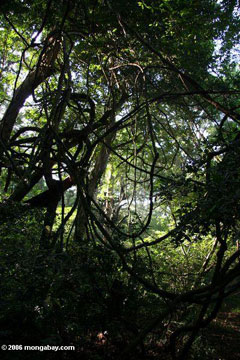Ugandan president continues to undermine national forest reserves
mongabay.com
November 4, 2008
President Yoweri Museveni’s ongoing battle with Uganda’s National Forest Authority
|
|
Ugandan President Yoweri Museveni — a leader who has repeatedly sought to hand forest areas over to industrial developers and undermine the sanctity of reserves — is now blaming the country’s forestry agency for deforestation in Uganda.
“National Forest Authority (NFA’s) name should be changed to National Deforestation Authority because they don’t care about forests. But we shall sort them out,” Museveni was quoted as saying by Uganda’s New Vision newspaper. “You cannot have investment without regulation of the environment.”
Museveni has been at odds with the National Forest Authority (NFA) over his attempts to grant 7,000 hectares of Mabira forest reserve to a sugar cane plantation company and to hand over a forest reserve on Bugala island in Lake Victoria to oil palm developers. Both projects have now been shelved (Mabira in October 2007, Bugala in May 2007), but Museveni has also battled NFA over evictions of encroachers in protected forests ordering the agency to halt evictions in 2005.
|
|
“The biggest challenge we have in the Government forest reserves is encroachment,” Moses Watasa, the public relations manager of NFA, told New Vision. “The local people have discovered that it is possible to trade their votes in exchange for land under protected areas.”
“When we go against the encroachers, politicians and businessmen who deal in items like timber resist us,” he continued. “It has got to an extent where NFA officials have been assaulted in the process of securing the forests.”
“It is true that deforestation is taking place, but much of it is affecting forests on private land. The mandate of NFA is restricted to forest reserves.”
New Vision reports that over 70 percent of Uganda’s remaining forest cover is located on private land, while 15 percent is managed by NFA.
Uganda’s annual deforestation rate has climbed 21 percent since the end of the 1990s. The country lost an average of 86,400 hectares of forest—or 2.1 percent of its forest cover—per year between 2000 and 2005. On a generational time scale, Uganda lost 26.3 percent of its forest cover (1.3 million hectares) between 1990 and 2005, mostly due to subsistence farming and cutting for fuelwood, but increasingly the result of industrial activities. This forest loss is directly threatening some of the highest concentrations of biodiversity in Africa: Uganda is home to more than 5,000 plant species, 345 species of mammals, and types of 1,015 birds.
Gerald Tenywa. Uganda: Politics, Corruption Fuelling Destruction of Forest Reserves. New Vision (Kampala) 2 November 2008
